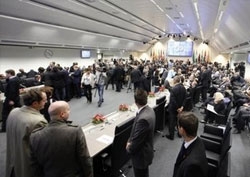OPEC caught in dollar crossfire
Yet higher commodity prices, which help to push up inflation, are also seen as a threat to the
 |
| Picture: AFP |
economic recovery.
The Organization of Petroleum Exporting Countries, which pumps 40 percent of world oil, chose last week to keep its official production target unchanged at a ministerial meeting in Vienna, home to the cartel's headquarters.
OPEC left its target at 24.84 million barrels a day -- where it has stood since the start of 2009 -- claiming the market is well supplied amid risks to the economic recovery and against a backdrop of mainly steady oil prices.
Crude oil futures have traded between 70 and 80 dollars for much of the past year but shot above 85 dollars in recent days, helped by the tumbling dollar and data showing surprisingly strong global demand for energy.
The spike came as OPEC members Algeria, Libya and Venezuela said they wanted to see prices at 90-100 dollars a barrel.
"Because the dollar is getting eroded, the price of commodities, particularly food and wheat are high," Libya's OPEC official Shukri Ghanem said on the sidelines of the Vienna meeting.
"Subsequently we are losing on our real income. We like to see a higher price up to 100 dollars," added Ghanem, who is head of Libya's National Oil Company.
However, mindful that a spike in prices could harm global economic recovery, OPEC kingpin Saudi Arabia said it was satisfied with current crude price levels.
The dollar extended its freefall against the euro and yen last week on growing expectations that the US Federal Reserve will pump out more new money to support flagging recovery in the world's biggest economy.
"A weaker US dollar is not without consequence as it erodes OPEC revenues in real terms and ends up tending to force higher oil prices and other commodity prices to compensate," said Neil MacKinnon, an economist at investment group VTB Capital.
"So oil producers face a dilemma here as oil prices much above 90 dollars would threaten the global economic recovery at a time when the US economy is already slowing down and the Fed looks ready to add more monetary stimulus," he told AFP.
A weak greenback makes dollar-denominated commodities like oil cheaper for buyers holding rival currencies, boosting demand.
Gold soared to record highs close to 1,390 dollars an ounce on Thursday as speculators rushed to the precious metal, which is also seen as a safe-haven in times of economic distress.
It came as OPEC Secretary-General Abdalla Salem El-Badri warned that fresh US stimulus measures could lift speculators' interest in crude oil, risking a surge in prices, as in in 2008 when they hit record highs above 147 dollars.
Meanwhile in an OPEC communique issued after its latest meeting, the cartel noted that "oil has increasingly emerged as an asset class, with excessive speculation adding appreciably to market volatility."
The 12-nation organization, whose members also include Ecuador, Iran and Nigeria, meets periodically to set output with a view to supporting its revenues and oil sector investment.
But as Commerzbank analyst Carsten Fritsch noted: "As oil prices are currently being driven by the financial market especially, OPEC's power of influence is limited at the moment."
What the stars mean:
★ Poor ★ ★ Promising ★★★ Good ★★★★ Very good ★★★★★ Exceptional
Related Contents
Latest News
More News
- Hermes joins Long Thanh cargo terminal development (February 04, 2026 | 15:59)
- SCG enhances production and distribution in Vietnam (February 04, 2026 | 08:00)
- UNIVACCO strengthens Asia expansion with Vietnam facility (February 03, 2026 | 08:00)
- Cai Mep Ha Port project wins approval with $1.95bn investment (February 02, 2026 | 16:17)
- Repositioning Vietnam in Asia’s manufacturing race (February 02, 2026 | 16:00)
- Manufacturing growth remains solid in early 2026 (February 02, 2026 | 15:28)
- Navigating venture capital trends across the continent (February 02, 2026 | 14:00)
- Motivations to achieve high growth (February 02, 2026 | 11:00)
- Capacity and regulations among British areas of expertise in IFCs (February 02, 2026 | 09:09)
- Transition underway in German investment across Vietnam (February 02, 2026 | 08:00)

 Tag:
Tag:




















 Mobile Version
Mobile Version